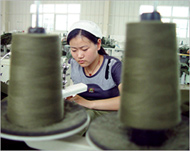Pascal Lamy appointed WTO head
Former European Union trade chief Pascal Lamy has vowed to steer troubled free trade negotiations to a successful end after he was named head of the World Trade Organisation.

The 58-year-old Frenchman was approved unopposed on Thursday by the WTO’s executive general council after three developing country rivals were eliminated in earlier rounds of the selection process for the top job in world trade.
“The 148 members of the World Trade Organisation today formally selected Pascal Lamy of France to be the organisation’s fifth director-general,” a WTO statement issued after the closed-door meeting on Thursday, said.
Lamy, a French socialist who has promised to act as “honest broker” between member states, will take over from Thailand’s
Supachai Panitchpakdi on 1 September.
Crucial task
In a statement issued to reporters in Geneva, Lamy declared: “We have a crucial task ahead: to complete the Doha Development Agenda Round of trade talks. This will be my immediate, first, second, and third priority.”
 |
|
A pressing problem is China’s |
His most pressing assignment will be guiding the WTO to success at a conference in Hong Kong in December. Trade ministers are scheduled to approve a draft deal for the Doha round, which aims to lower barriers to business across the global economy.
But also looming large is how to handle the growing trade power of China, displayed most recently in its surging clothes and textile exports, which are threatening to unleash a wave of protectionist measures in rival countries, both rich and poor.
In declaring his WTO candidacy last December, Lamy proclaimed “the priority must be to re-balance the international trading system in favour of developing countries”.
But winning an accord in Hong Kong, which would clear the way for the free trade round to be finalised in 2006, is a tall order, particularly if relations between the major trade powers, including China, deteriorate.